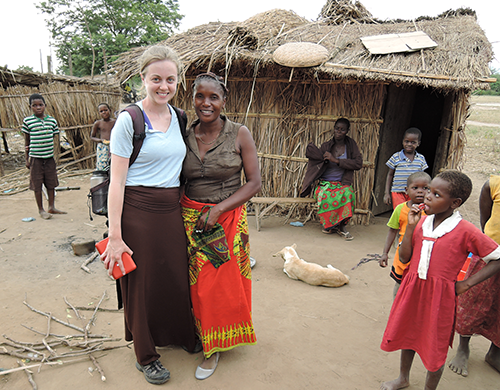Allyson Nelson, MSPH ’15
International Health
Global Disease Epidemiology and Control Program
Allyson Nelson graduated from International Health's Global Disease Epidemiology and Control Program (GDEC) in 2015. As a student at Hopkins, Allyson worked in Malawi managing the day-to-day operations to start up a large field trial evaluating the safety of oral cholera vaccine during pregnancy. The results from that study were just published in Lancet Infectious Diseases. The study found significant evidence that the vaccine is safe to administer during pregnancy. You can read more about in an article in this issue of The Globe.

After graduation, Allyson joined Jhpiego, a non-governmental global health organization. She’s currently based in Liberia helping the country’s Ministry of Health build a stronger, more resilient health system. Allyson took some time to answer a few questions about her experience as a student in International Health and her current work at Jhpiego.
Can you tell me a little about your work with Jhpiego?
I’m the Monitoring, Evaluation and Research Manager for our projects in Liberia. My 9-person team is responsible for conducting studies and monitoring results to make our programs more efficient and effective, and supporting the government to improve health information and surveillance systems to strengthen health systems and the health workforce, ultimately improving health outcomes. For instance, we work with midwifery and lab technician schools and in health facilities throughout the country to strengthen the quality and availability of health care and to build diagnostic capacity. Strengthening the frontline health workforce is critical to reducing maternal and newborn mortality and to preventing infectious disease outbreaks from becoming epidemics like Ebola did in 2014.
What was the topic of your master’s thesis in International Health?
I wrote it on the work I did in Ghana helping implement an innovative midwife training program across the country. The first 24 hours of an infant’s life are critical for survival. In Ghana, the mortality rate during this time period was very high. The project held short training sessions for midwives at health facilities to help prevent, diagnose and treat some of the most common causes of maternal and newborn mortality, as well as stillbirths that occur during labor. In addition to the training, midwives used models to practice skills, had mentors to review cases with, and received messages and quizzes through SMS to help them retain their knowledge and skills. I’m in Ghana now, in fact, collecting the final data from the program I helped start as a student. Keep your eyes out for the exciting results!
Can you describe what it was like working in Malawi on the oral cholera vaccine study?
It was an emergency situation. Every day was different. Around 100,000 people had been displaced by flooding and had no food, water, or shelter. The government and many international organizations were operating programs to meet the basic needs of people who had lost everything. The Hopkins study team couldn’t just focus on conducting our study. We felt it was our duty to contribute however we could. We worked closely with the district health teams to coordinate our study and to find ways our technical expertise in cholera surveillance and vaccination could help the emergency response.
The experience really helped me learn how to manage multiple priorities, be flexible while still accomplishing the goal, and most of all the importance of taking time to listen to the concerns and needs of the end beneficiary and their community. It was also an amazing opportunity to work with some of the top researchers at the Bloomberg School. Their trust and confidence in me to carry out the study spoke to the high-quality training my degree program had provided. Faculty such as Dr. David Sack, who asked me to work on the study, Dr. Mohammad Ali and Dr. Francisco Luquero were wonderful mentors. Their efforts were key to making this study happen in the short time it did.
Do you have any advice for current and future International Health students?
Remember that faculty want to involve students in their work. Don’t be afraid to put yourself out there. If you want to develop certain skills or explore a new area, there will be chances for you to practice them under faculty mentorship if you seek out the opportunities. One more thing: save your course work after graduation. Just the other day I was digging through slides from my biostatistics course to get ideas about how to analyze data from one of the projects I’m working on.
